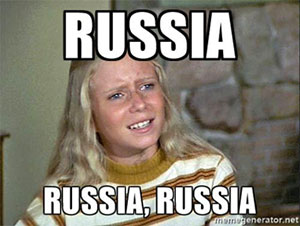I don’t know about you, but I am growing weary of the media’s obsession with what Russia did or didn’t do during the 2016 presidential election.
I have no doubt that Russia and other foreign countries — such as China and North Korea — routinely try to stick their noses into our political and economic business.
That’s why Special Counsel Robert Mueller recently charged 12 Russians with hacking into the Democratic National Committee servers.
And despite the attention, that won’t be the last time foreign powers try to disrupt our country.
Just last week, for example, The Wall Street Journal reported that some bad guys from Russia hacked into our national electric grid last year. This access could allow them to disrupt our electrical supply with blackouts.
Regardless of how all this turns out, one thing we can be sure about is that Americans are losing confidence in our voting process.
A poll from the Knight Commission on Trust, Media and Democracy found that their faith in the U.S. election system hit an all-time low.
Only 24% of American voters are “very confident” that votes will be accurately counted in this year’s midterm elections. And 58% expect foreign governments will again attempt to interfere.
But there is a solution to preserving the integrity of elections …
How so?
By incorporating blockchain technology into the voting process.
Related story: Russia Investigation Stumbles into Crypto
Most people — maybe even you — associate blockchain with cryptocurrencies like Bitcoin. But blockchain technology can be used to secure everything from voter registration to vote counting.
Best of all, the distributed ledger feature of blockchain technology will make the entire voting process transparent and, most importantly, unhackable.
The key concept of a distributed ledger is that it makes a permanent, immutable and verifiable record of any transaction between two parties.
Transactions also take place over a worldwide network of computers that, together, verify transactions and prevent them from being altered.
It is this security that makes blockchain technology so applicable to voting. Every ballot would be embedded with a digital code and stored in transparent databases that cannot be tampered with, changed or deleted.
Would-be hackers would have to change the code of every transaction all across the globe, which is functionally impossible.
Guess what! Blockchain-based voting is already a reality.
In its May primaries, West Virginia used blockchain-based ballots for overseas military voters from two of its counties. Election officials are so pleased with the results that they’re planning on expanding the blockchain system to the entire state for the November elections.
Now, West Virginia’s success has gotten the attention of other states: Ohio, Colorado, Delaware and Illinois have passed some form of blockchain election legislation. And I think it’s only a matter of time before blockchain technology will be used to secure all U.S. elections.
It can’t happen soon enough.
That is also why you should pay careful attention to the “technology” portion of the Weiss Cryptocurrency Ratings. Chances are that our highest-rated coins will be the backbone of the blockchain voting process. To see our latest crypto technology ratings, click this link and complete the form.
Best wishes,
Tony